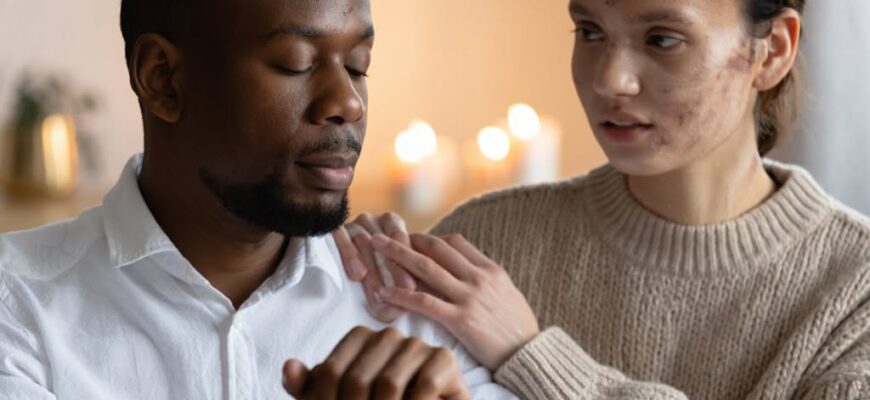At the age of twenty, an unfortunate kitchen gas explosion occurred while I was preparing a meal. The flames inflicted deep wounds along my face, neck, and back. Since that tragic evening, men never looked at me with affection; their gazes reflected either curiosity or silent pity.
It was then that I crossed paths with Obipa, a tender-hearted music instructor who happened to be blind. Unlike others, he never stared; he simply listened. He caught my voice, sensed my gentleness, and cherished the person within.
Our relationship blossomed over a year, and when he asked for my hand in marriage, the neighborhood buzzed with unkind whispers.
“You agreed only because he cannot see the scars you bear.”
Chuckling, I responded,
“I’d prefer a partner who perceives my soul, not one who judges merely my skin.”
Our wedding was intimate but radiant with melody and warmth. I chose a dress with a high neckline, concealing every scar, yet for the first time, I felt no urge to hide.
That evening, in our cozy apartment, Obipa carefully explored the lines of my fingers, face, and arms.
“You are far more beautiful than I imagined,” he murmured.
Tears welled up until his subsequent words froze me.
“In fact, I have seen your face before.”
My breath caught. “But you… you are blind.”
“I was,” came his gentle reply. “Three months ago, I underwent a delicate eye surgery. Now, I can perceive vague shapes and shadows. I kept this hidden — from everyone, including you.”
My heart raced. “Why keep such a secret?”
“Because I wished to love you without the interference of worldly vision. I wanted my heart to recognize you before my eyes could. And when I finally saw your face, I wept — not because of your scars, but because of your profound strength.”
He had truly observed me, yet still embraced me. His devotion was rooted in courage, not blindness. From that night onward, I believed I deserved to be loved.
Episode 2 – Memories Among the Blossoms
The following morning, sunlight poured through the curtains as Obipa strummed a gentle melody on his guitar. Yet one query remained unanswered.
“Was that really the first moment you saw my face?” I inquired.
He paused, then said, “No. The initial glimpse was two months prior.”
Obipa recounted visiting a small garden near my workplace after his therapy. One day, he spotted a woman wearing a headscarf — me — sitting quietly alone. A child dropped a toy, which I picked up with a smile.
“The light touched your face,” he recalled, “I noticed no scars. Instead, I perceived warmth, the beauty woven in your pain. I saw you.”
He was uncertain initially until hearing me hum a melody familiar to him.
“I remained silent because I wanted to be sure my heart heard your tune more clearly than my eyes could see.”
My eyes brimmed with tears. For years, I had concealed myself, convinced no one could love me as I was.
This man, however, adored me entirely.
Together, hand in hand, we walked to that garden. For the first time, I removed my headscarf in public. People stared, but instead of shame, I felt liberated.
Episode 3 – The Photograph of Affection
One week later, Obipa’s students presented us with a photo album from our wedding. I hesitated to look inside, wary of what others might see.
We sat on the living room rug, leafing through pages filled with joy and music.
Then I discovered a picture that took my breath away. It was unposed and untouched.
I stood near a window, eyes closed as soft sunlight enveloped me in gentle shadows.
For the first time, I appeared serene, not marred by scars.
Obipa held my hand firmly.
“This is the woman I love,” he affirmed.
In that silent instant, it dawned on me: true beauty lies not in impeccable skin but in the bravery to continue living, loving, and allowing oneself to be truly seen.
A Final Reflection of Hope
Today, I walk with renewed assurance. Whether Obipa’s eyes perceive shadows or light matters little; what counts is the vision that transcends pain and embraces love. His unwavering acceptance taught me that genuine connection comes from beyond the surface.
Key Insight: Love recognizes the soul’s depth rather than the exterior’s flaws, and courage is the truest form of beauty.
